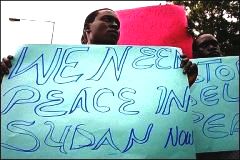Sudan hopes to taste fruits of peace
By Andrew England, The Financial Times
NAIROBI, Jan 25, 2005 — When John Garang, leader of southern Sudaneserebels who fought a 21-year conflict with the government in the north, arrived in this dusty town, large crowds turned out in the debilitating heat to sing, dance and slaughter bulls in his honour.
 But last weekend’s gathering was not simply a show of respect. It was as much an expression of hope by a war-weary, impoverished population that the civil war that caused about 2m deaths may finally have ended.
But last weekend’s gathering was not simply a show of respect. It was as much an expression of hope by a war-weary, impoverished population that the civil war that caused about 2m deaths may finally have ended.
One banner summed up people’s aspirations: “Our victorious SPLA shall immediately transform war policies into development.”
But as well as expressing hope, the message reflects the massive challenges facing the authoritarian guerrilla movement.
In just a few months, it has to transform itself into a functioning government and begin to meet the expectations of its people in an area roughly the size of Germany and Italy combined, with some of the lowest social indicators in the world.
The war formally ended when Mr Garang’s Sudan People’s Liberation Army signed a peace deal with Khartoum on January 9.
Under the accord, the southern Sudanese will have their own government for a six-year transition period, giving them the chance to rebuild their devastated region. Donors have already recruited the services of international consultants KPMG and Bearing Point to help in the process.
But the hard work is only just about to begin. Rumbek, the regional capital with a population of some 50,000, will be the temporary seat of the southern administration. Yet it has neither electricity, piped water nor a single paved road. Hardly a building stands that does not bare the scars of war or neglect. “I run the region but I don’t even own a bicycle,” said Daniel Deng Monydit, acting governor of Bahr al-Ghazal region.
The international community’s support for the process will be crucial, and donors have set up a $16m (?12m, £8.5m) “capacity building” fund to help the former rebels buy equipment, pay salaries and implement small-scale projects.
KPMG has a one-year contract to verify how the money is spent and assist in creating a financial monitoring unit to counter the huge potential for graft.
A donors’ conference for the whole of Sudan scheduled for April could raise several billion dollars more, while the US has separately appropriated $311m just for the south in 2005.
The SPLA can also count on at least $600m in oil revenue a year under wealth-sharing agreements, according to foreign experts.
Yet getting the funds to flow is the least of the SPLA’s problems as it deals with the expected return of large numbers of displaced people, deep mistrust between north and south, and potential divisions within the SPLA and other southern groups.
Huge questions also hang over the movement’s ability to absorb the aid. “We are starting almost from zero. It’s unprecedented that you have to construct a government from scratch,” said Jon Bennett, UN team leader of joint mission set up to prepare a plan for donors.
“It’s how to deal with this in a time-frame to prevent the southern administration being deemed a failure. We know that unless visible improvements are there very soon, there’s potential for further conflict, even on a south-south basis.”
There is just one bank in Rumbek, and it lacks electricity and has no computers. A new currency and central bank are supposed to be introduced, but until then currency flows are unregulated.
Southerners, cut off from the rest of Sudan, trade in US dollars, Kenyan and Ugandan shillings and decrepit Sudanese pounds, which have not been legal tender in the rest of the country since the 1990s.
There are also differences of expectations between donors, who want to begin the rebuilding process from a low base, concentrating on basic services, and some SPLA members who expect rapid large-scale development.
The SPLA has already indicated that it wants to set up a 40,000-strong civil service, growing to 100,000 in size over the six-year period, which Mr Bennett says will be “difficult to sustain”.
Other Sudan experts say the figure is unrealistic and express concern about the capabilities of the SPLA, which will also have to play a significant role in transitional institutions in the north.
Keeping southerners united will pose further challenges. In the past, southern groups, some backed by Khartoum, have fought each other. In November, the SPLA was forced to hold meetings after disputes surfaced within the leadership.
“They can do it but there will be a lot of challenges and there will be the temptation that one of the enemies of peace will try and bribe them to take them off the road of peace – not only in the south but also in the north,” said David Nok Marial, a member of a Sudanese aid group and former rebel officer.
